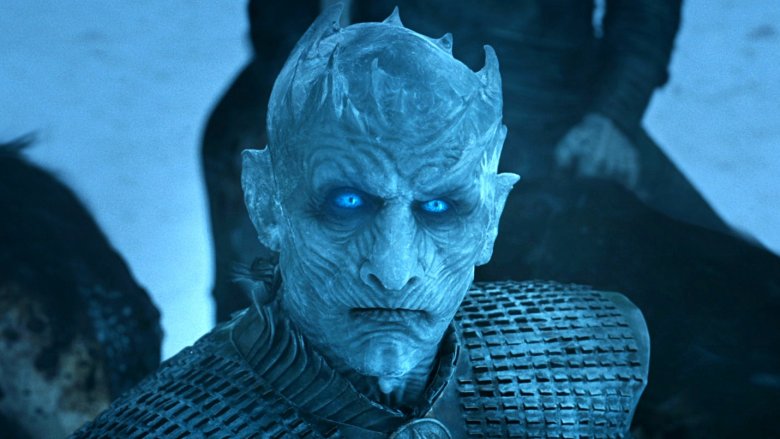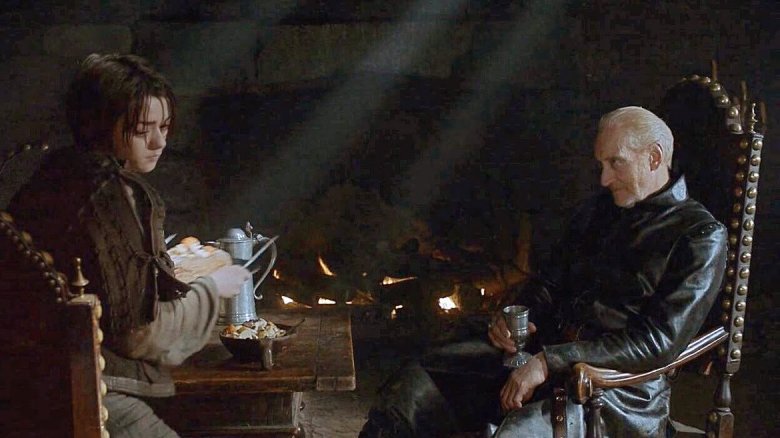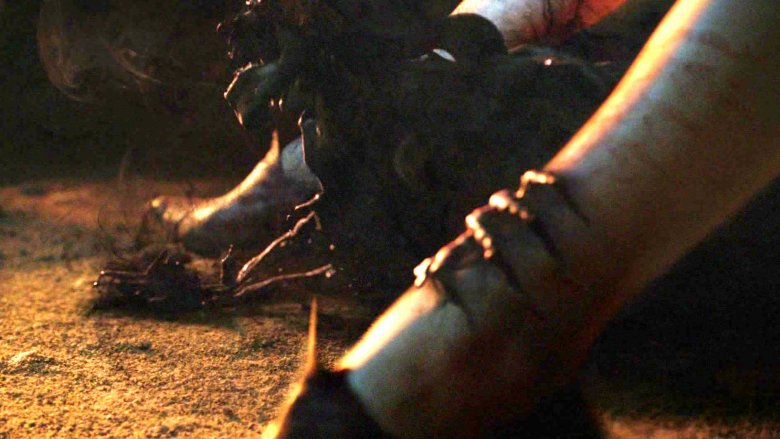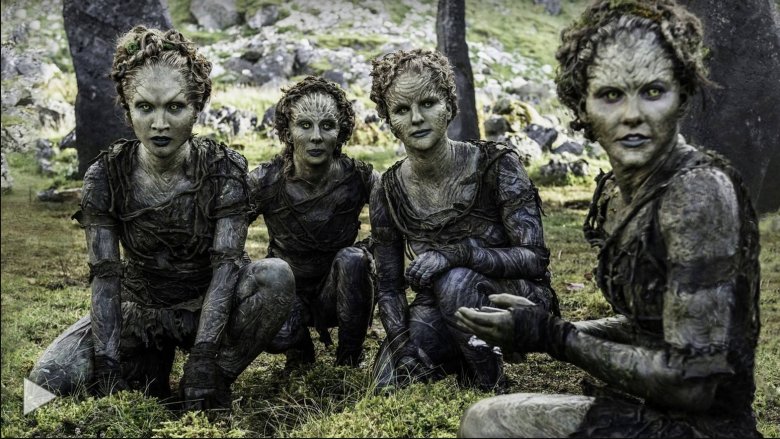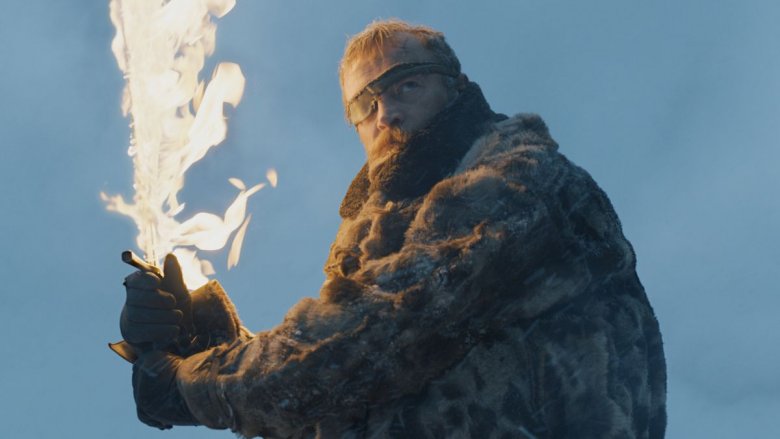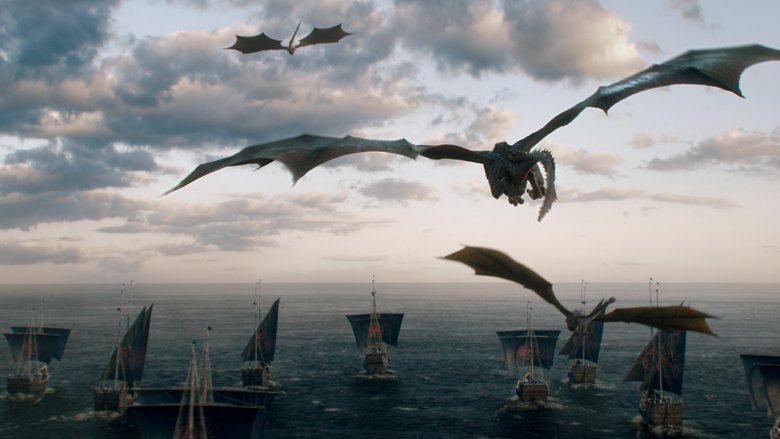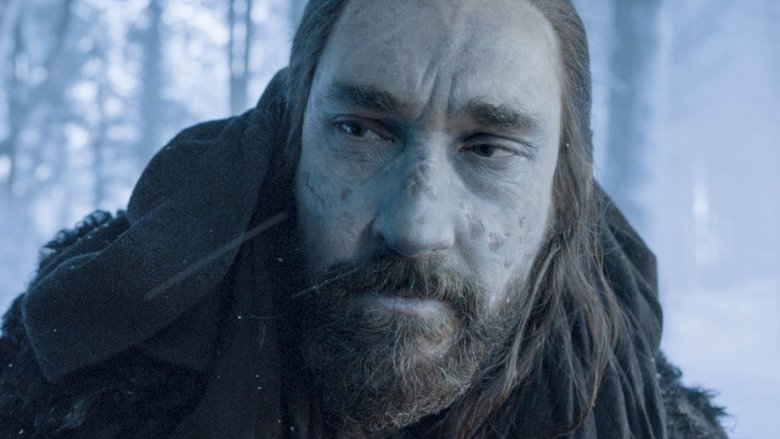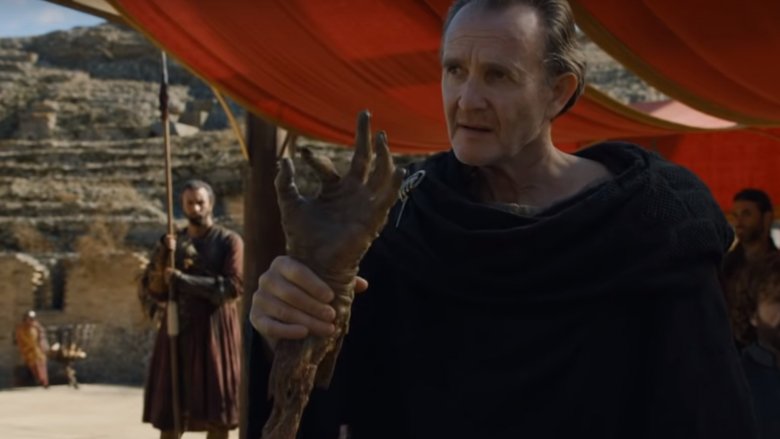Game Of Thrones Details Most Fans Still Don't Understand
Game of Thrones might not be the most confusing show on television — frankly, it's not even the most perplexing series on HBO — but with such a sprawling list of locales, various beings with a magical bent, and a cast of characters whose motives seem to shift at the drop of a hat (er, a crown), the show has certainly had its fair share of head-scratching moments.
While some of the dangling plot threads on Game of Thrones have since been resolved over time (like the long-lingering questions of "Where did Gendry sail off to?" and "What ever happened to Nymeria?"), there are still some elements of the show that remain inexplicable to even the most diehard fans. From its conflicting timeline problems to some serious supernatural inconsistencies and a series of bonkers character choices, here's a look at some of the things that still don't make sense about Game of Thrones.
Why was Arya so unrecognizable before she became no one?
For all his faults, Tywin Lannister was no dummy. And yet, fans were expected to believe that when he was brought face to face with Arya Stark — before she started snatching peoples' identities, of course — he didn't recognize the daughter of Eddard Stark. He had been warring with her brother Robb's forces shortly before this, so no doubt the master battlefield technician had done his homework on the Stark brood. Somehow, he never put it together that this girl who could read, lied about being from the North, and spoke to him of Robb, her favorite brother, with a twinkle in her eye, was a Stark herself.
Further, Petyr Baelish, a.k.a. Littlefinger, apparently did recognize her when she was serving wine to himself and Tywin in King's Landing and decided against telling the boss for some inexplicable reason. Considering he had no trouble plotting to have her father murdered, and outing Arya would likely be a feather in his cap with the Lannisters, it required some suspension of disbelief to accept that Littlefinger wouldn't use the information on Arya's whereabouts to his advantage. There's no way he was just being merciful and kind all of a sudden. Too bad for him — letting Arya get away back then proved to be a massive mistake for him in particular, even though he didn't know it at the time.
Why was Melisandre's monster only a one-time deal?
The Red Witch has been at the center of some very befuddling moments throughout Game of Thrones' run. For example, the big revelation that when she takes off her choker necklace she reverts back to her true haggard crone body might've been a surprise to watch, but it ran completely counter to the fact that she'd already been seen without it earlier in the series and maintained her regular form. She's also swung and missed several times with her theory on the identity of the "prince who was promised," Azor Ahai.
One question that seems to trail Melisandre throughout her precarious stint on the show is why she was able to produce a shadow demon with Stannis Baratheon to assassinate his brother Renly, but has never bothered to pull off that particular trick again. It wasn't as though Stannis was anyone special — she sure learned that the hard way — so the gift to birth smoke monster babies was all hers. Certainly, such a powerful creature could have come in handy later on when, say, her beau was losing his battle against Ramsay Bolton. So why did she resort to the horrendous measure of burning Stannis' daughter Shireen alive at the stake instead of just bringing another bundle of butchery into the world?
Where are the other Children?
In Game of Thrones' fourth season, we were introduced to Leaf, a two hundred-plus-year-old humanoid who belonged to an ancient race called the Children of the Forest. She served the original Three-Eyed Raven and helped Bran escape the White Walkers, sacrificing herself in the process. Thanks to her, we learned a lot about the Children — they were the ones to create the White Walkers as a means of fighting off the scourge of mankind, but when they lost control of their lethal creations, they teamed up with people to build the Wall and save Westeros from those blue-eyed zombies — thus, Leaf's allegiance to the Three-Eyed Raven.
We also know that the Children's numbers were once again decimated once the Andals made way to Westeros, but since she was still around by the time Game of Thrones picked up, at least some of her species survived. Since her death, though, none of her kind have been seen. Sure, they're known to lurk in the shadows to avoid another round of extermination and all, but considering their history of making wight-fighting a group effort, you'd think at least one more of the Children would've surfaced by now. Or are we to just forget they even exist now that they've served the purpose of creating a story time parallel for Jon to draw Daenerys' alliance? Who knows.
Was the beyond-the-wall designed to fail?
Jon Snow went to a lot of trouble to secure some dragonglass from Daenerys Targaryen. He defied his people by even going to Dragonstone in the first place, and he was basically a prisoner of the Mother of Dragons until he decided to go off on his little suicide mission to steal a wight for Cersei. All the while, she did let him mine for the stuff, which is one of the few substances that is known to slay a White Walker, so he had to have stored up a pretty healthy supply before he assembled his troops at East Watch.
Somehow, though, Jon and his merry band decided to do the mission on foot instead of horseback and they came armed only with their ordinary weapons instead of ones bolstered with dragonglass — even though they had a skilled blacksmith who was vocally praised for his speed right there on the team. Jon might've had a sword made of Valyrian steel, and Beric Dondarrion had his fire sword, but everyone else was left high and dry without a sensible weapon to protect themselves from the dangers they were all well versed on in advance. Accepting that their ill-preparedness probably lent itself to more tension in the scenes, the group's decision to forego bringing the stuff they'd just travelled the globe to get was tough to understand, plain and simple.
How do these people all move so fast?
One of the most recurrent issues with Game of Thrones is how some of the characters are able to inexplicably travel at light speed, or even appear out of nowhere, for the sheer sake of plot convenience. For one thing, those ravens seem to have some kind of secret warp portal for how quickly they can deliver messages on the fly. Then there was that weird moment when Varys seemed to leap from Westeros all the way to Meereen in no time at all (which was later dismissed as a matter of timelines not being in sync as we see them). And let's not forget how the Sand Snakes made their way onto a ship they'd just watched sail away without them on board.
Perhaps the most egregious example of this happened in season 7, when Jon Snow and company found themselves in serious trouble as the Night King's army surrounded them North of the Wall, and they sent the injured Gendry to get help... on foot. Somehow, Gendry was able to trod his way back to East Watch and send a raven all the way over to Daenerys back on Dragonstone, who then stormed onto the scene just in time to save the day at the cost of one-third of her dragons. The director of the episode, Alan Taylor, has since chalked it all up to he and producers "fudg[ing] the timeline" and leaning on "plausible impossibilities" to carry the plot forward, but even he couldn't explain the breakneck speed of the rescue mission.
Why couldn't he fit on the horse, too?
Not since Titanic, when Jack definitely could have fit on that door, has a character's decision to needlessly sacrifice himself been so irritating as when Benjen Stark decided to send Jon Snow away on horseback alone in Game of Thrones. The return of Jon's beloved Uncle Benjen was long overdue, and it put to bed all those long-lingering theories about him secretly being a book character called "Coldhands" (not that George R.R. Martin himself hadn't already debunked the idea). The decision to bring him back at that exact moment, when Jon was facing certain death from an army of wights, was deus ex machina to the extreme. Benjen's fate was one of those loose ends that needed to be tied, sure, but he literally came out of nowhere.
Benjen's big return was also short-lived. Instead of springing Jon from his undead trap and whisking his near-hypothermic nephew off to safety, he gave him his horse to seek rescue — "ride for the pass" — and hung back to be devoured by White Walkers. His reason for not joining? "There's no time." Given the lag between the horse getting to a gallop and Benjen's last stand, though, there was quite obviously time, and there was also visible space on the animal's back for both of them to fit. In theory, Benjen's weight might have slowed the horse too much, but we'll never know because he didn't even try.
Why are there so many wight skeptics out there?
Convincing the world that an army of wights exists and is a threat to the whole of civilization has been quite a challenge for our heroes. Daenerys, the Mother of Dragons, had to see them in person before she could truly believe in their existence and the danger they posed to everyone — but nice try unearthing those ridiculously convenient cave drawings, Jon. And after witnessing the limbs of a kidnapped creature scuttling around on its own, Cersei seemed pretty unconvinced and unconcerned about the whole ordeal. Even the maesters, who have access to the whole of recorded human knowledge, had a hard time buying that there's a Three-Eyed Raven out there warging his way into witnessing this zombie army on the move.
A healthy amount of skepticism about such a thing might be understandable under ordinary circumstances, but each and every one of these characters has had a brush with weird before. Daenerys single-handedly resurrected the dragons, for example, and Cersei's bodyguard the Mountain is only partially alive. She also had firsthand experience with the fulfillment of a prophecy (about the deaths of her children), and the Archmaester, like, just saw someone with a wicked case of greyscale. Between all that and the other inexplicable phenomena going on in the series — Wildling giants, murderous smoke monsters, the Lord of Light's resurrections, and the Many-Faced God, to name a few — it seems pretty hard to believe that the frozen walking dead is the one thing they can't understand around Westeros.
